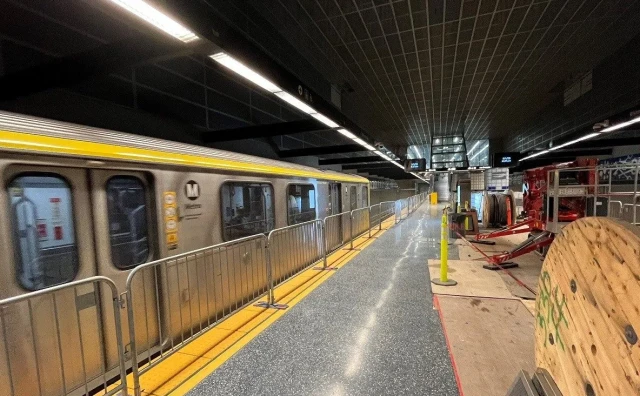With our free press under threat and federal funding for public media gone, your support matters more than ever. Help keep the LAist newsroom strong, become a monthly member or increase your support today during our fall member drive.
AI could help detect irregular heart rhythms in EKGs that humans can't see
JUANA SUMMERS, HOST:
Using artificial intelligence, cardiologists have developed a way to predict who will develop atrial fibrillation, or A-Fib. It's a common type of arrhythmia that can be dangerous if left untreated. NPR's Allison Aubrey reports.
ALLISON AUBREY, BYLINE: If you've ever had an EKG, or electrocardiogram, you know they're quick and painless. Tiny electrodes are placed on your chest, and your heart's electrical signals display as little waves and squiggles on a screen. Dr. Neal Yuan of the San Francisco VA Medical Center says this gives him lots of information to help make a diagnosis.
NEAL YUAN: We look at all those squiggles, and then we say, well, we've got these rules for what sort of squiggle patterns look like what. And we have certain ideas for certain diagnoses based on certain patterns.
AUBREY: This may sound straightforward. The EKG has been around about a hundred years, and doctors know how to spot the obvious things - say, a heart attack or active A-Fib. But inside these little squiggles and waves, there's lots of information that doctors just can't easily see. But Dr. Yuan says technology can help.
YUAN: The machine can learn from seeing millions of ECGs. And it doesn't forget, and it, you know, doesn't grow tired (laughter), unlike, you know, humans.
AUBREY: He says each EKG produces about 20,000 numbers to decipher, which can overwhelm the human brain. But a machine can crunch these quickly. So as part of the new study, funded by the National Institutes of Health, he and some collaborators at Cedars-Sinai fed millions of data points from EKGs into a computer.
YUAN: What deep learning and machine learning allows us to do is it can hash through all of that information in the 20,000 different numbers.
AUBREY: And identify complicated relationships. In his study, the goal was to identify who is at risk of A-Fib. So they had the machine assess the EKGs of patients who'd had A-Fib in the last month compared to those who had not to look for subtle differences.
YUAN: So it essentially takes in an ECG, and then it makes a guess based off those 20,000 numbers. And then it learns whether that guess is right or wrong, and then it adjusts its model to make a better guess next time.
AUBREY: Turns out the model they developed actually helped them predict who would develop A-Fib.
YUAN: I'm really excited about it.
AUBREY: Their new study, published in the medical journal JAMA Cardiology, is the first step to bringing this to clinical practice.
YUAN: We are at the forefront of this wave right now, right? And it's definitely coming.
AUBREY: Used in the right ways, he says AI can help doctors do their jobs better. Allison Aubrey, NPR News. Transcript provided by NPR, Copyright NPR.
At LAist, we believe in journalism without censorship and the right of a free press to speak truth to those in power. Our hard-hitting watchdog reporting on local government, climate, and the ongoing housing and homelessness crisis is trustworthy, independent and freely accessible to everyone thanks to the support of readers like you.
But the game has changed: Congress voted to eliminate funding for public media across the country. Here at LAist that means a loss of $1.7 million in our budget every year. We want to assure you that despite growing threats to free press and free speech, LAist will remain a voice you know and trust. Speaking frankly, the amount of reader support we receive will help determine how strong of a newsroom we are going forward to cover the important news in our community.
We’re asking you to stand up for independent reporting that will not be silenced. With more individuals like you supporting this public service, we can continue to provide essential coverage for Southern Californians that you can’t find anywhere else. Become a monthly member today to help sustain this mission.
Thank you for your generous support and belief in the value of independent news.

-
Kevin Lacy has an obsession with documenting California’s forgotten and decaying places.
-
Restaurants share resources in the food hall in West Adams as Los Angeles reckons with increasing restaurant closures.
-
It will be the second national day of protest against President Donald Trump.
-
The university says the compact, as the Trump administration called it, could undermine free inquiry and academic excellence.
-
This is the one time you can do this legally!
-
Metro officials said it will be able to announce an opening date “soon.”







